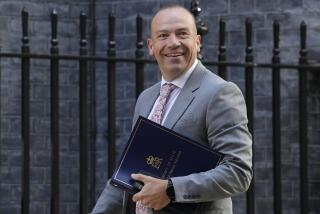Britain Releases Prisoners as Part of N. Ireland Peace Deal
BELFAST, Northern Ireland — The British government began the slow, controversial process of releasing convicted terrorists Friday under terms of April’s historic Northern Ireland peace accord.
Three Irish Republican Army members and three pro-British militants from the outlawed Ulster Defense Assn. walked free at midday from the top-security Maze prison southwest of here.
Most of those released had served only a third of their sentences for crimes ranging from extortion and “gross bodily harm” to bombings and attempted murders.
While the UDA men covered their faces as they left with relatives, the IRA trio was welcomed by high-profile members of the IRA’s political wing, Sinn Fein.
The Sinn Fein delegation included Brendan McFarlane, who led the IRA prisoners’ hunger strike inside the Maze that claimed 10 lives in 1981, and Gerry Kelly, who led a mass breakout of 38 prisoners there in 1983.
April’s accord specified that more than 400 IRA, UDA and Ulster Volunteer Force prisoners should be freed by mid-2000 in reward for those groups’ continuing cease-fires. The IRA called a cease-fire in July 1997, while the UDA and UVF jointly called off their campaign of killing Roman Catholics in October 1994.
The agreement also allowed individual inmates convicted of politically motivated offenses to apply for early paroles.
At the lower-security Magilligan prison near Londonderry on Friday, a pro-British militant won early parole from his manslaughter sentence for brutally kicking a Catholic man to death in 1995.
More to Read
Sign up for Essential California
The most important California stories and recommendations in your inbox every morning.
You may occasionally receive promotional content from the Los Angeles Times.









